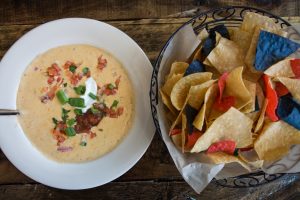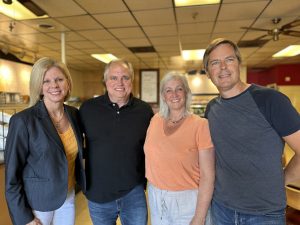They say to dream big, and that’s exactly what Ben Bell did when he first thought of opening a sake brewery in Arkansas. Sake, a Japanese rice wine, would do well in Arkansas, he thought, especially considering the state’s production levels.
His journey into making this dream a reality has turned out to be a bigger adventure than he could have imagined.
Sake was a far cry from Bell’s plan as a child – to become an astrophysicist. He laughs, “I was mostly happy with the idea. … I was actually not a good physics student.”
Although born in Little Rock, Bell moved to Louisiana at an early age, but eventually landed in the Sheridan / East End area. He pursued physics, going to high school at the Arkansas School for Mathematics, Sciences and the Arts in Hot Springs before heading to a small liberal arts college in Iowa.
But he returned to Arkansas with a different goal.
“When I came home I thought I was going to play music and book bands,” he explains, “But that did not work for me.” During that time he began working at Colonial Wine and Spirits and began increasing his knowledge of alcohol. “I guess I knew the difference between a red and white wine, and I could tell you what a stout was,” he says, “but that was it.” He started consuming books and taking in as much information as he could.
Then, two key events brought sake to the forefront in Bell’s life. A friend asked him if he wanted to homebrew, and Colonial presented him with a good craft sake to try.
He remembers that clearly – “In my mind it looked like a white wine, so I drank it like one … and I was shocked at how good it was.” And even though the sake he and his friend homebrewed wasn’t the best, he enjoyed the process.
That’s when it first clicked.
“I knew there was something to this that needed to be explored, and there was something about it on the production side that had promise for Arkansas.”
Even then opening a brewery was Bell’s endgame. Sake isn’t exactly rampant outside of Japan, however, and he knew he would have to travel to learn from the pros. New York is the sake hub in the US, so he traveled there often for seminars and even obtained a certification.
“The more I got into it, the more I thought sake is interesting and the standard of quality is higher than I could have imagined,” he says.
He began to examine the state of rice in Arkansas to see just how plausible a brewery was – as someone had to be growing a specific type of rice. “As luck would have it, there is a farmer that … has been growing sake rice for a few years,” he says.
Now all he needed was the production experience.
He reached out to his sake certification teacher and asked for direction, knowing he would likely have to travel to Japan. In response he got an email asking if he could make the trip solely for an interview. He remembers, “I read over the email and I thought .. is this right? I would travel all the way there just for an interview?”
He saw it as his one shot and talked himself into it. He had studied some Japanese, but he quickly found out that theory and practice are two different beasts. He was late to the interview due to a slight travel mishap, and the first thing the brewery president asked him was if he could conduct the interview in Japanese. Bell couldn’t, and the English-speaking president told him he couldn’t work there.
That was a dark moment.
He did, however, take Bell on a tour. After talking with Bell for some time he recognized the knowledge he had and offered Bell a silver lining. Bell remembers, “He said the next time you come, I can’t give you a job but you can train for two weeks.”
When he got back to the states he licked his wounds, but continued forward. His sake teacher, John Gauntner, was hosting a higher level certification sake course in Tokyo. Bell knew he had to take it, and see if he could also train while there, taking up the president’s offer. He passed his exam, and then began working.
“I was not physically ready,” he says, “and during the course of working I hurt my back and ended up hurting it permanently.”
He finished out his time in training, although working less than he had anticipated, before returning to the states. Any normal person might have given up at that point, and Bell did feel discouraged. “I would go back and forth thinking, maybe I can do this, maybe not,” he remembers.
But Hot Springs just happened to have a sister city in Japan – Hanamaki – and a connection with a sake brewery there, Nanbu Bijin. And that was all Bell needed to end up in Japan for two years, working six days a week learning everything he could.
He gives credit to three people for helping make it all possible – Mary Neilson, head of the sister city site in Hot Springs; Fumiaki Sasaki, head of the sister city side in Hanamaki; and Kosuke Kuji, president of Nanbu Bijin.
Bell’s two-year stay was anything but easy. There was the language barrier, the physicality of the work, and the fact that he was in a completely new place, oceans away from home. Plus, he was a bit of an anomaly, as foreigners don’t typically study sake production.
“I didn’t understand how unusual it was for a foreigner to be training in a brewery, and how culturally important sake is in Japan,” he explains. Thus he was interviewed many times by local television stations and newspapers which he laughing says, “I was not prepared for.”
He had too many adventures overseas to detail in this article. Probably his favorite memories include sharing sake with his brew family. He says, “If we went out, we would have what’s called a nomikai at the brewery – it means “drinking party” – where we would break out a bunch of our sake. Normally when we had guests we would have a nomikai.”
And guests from all over the world – Italy, Dubai, Australia and others – would come and share sake. That’s pretty powerful, especially now that Bell is making plans to open an Arkansas sake brewery by next year, which he admits, won’t be easy. “The next part is a whole different challenge. It’s not just brewing sake, it’s starting a business.”
Beyond checking water reports, marketing, construction, and production, Bell also hopes to be the sake go-to for Arkansans, adding an educational element.
When he finally gets up and running, he’s excited that he’ll have the technical support of Nanbu Bijin. Until then, you can follow his future tastings, information events, and progress at Sake Arkansas.
Bell wants to make a name for sake in Arkansas, which he can only do with Arkansas’ support. He says, “I want people to learn about sake. I feel like if you want to see something like this happen and succeed you can’t leave anything to chance. So, you can’t just expect someone to just magically come along and educate everyone about sake – you’re that person. You have to be.”





